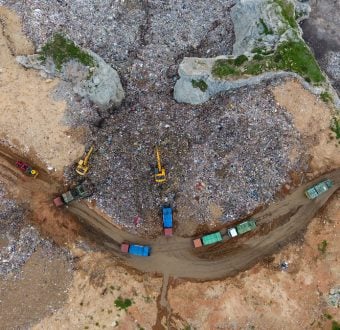Today, Greenpeace USA and Waterkeeper Alliance published a ground-breaking report on Energy Transfer Partners’ poor safety record, analyzing sixteen years of operations for the company’s existing oil and hazardous liquids pipelines. Based on public data from the Pipeline and Hazardous Materials Safety Administration (PHMSA), the ‘Oil and Water: ETP & Sunoco’s History of Pipeline Spills’ report and accompanying interactive map show that the company’s pipeline network has experienced a steady stream of pipeline spills totaling 527 incidents from 2002 to 2017. The report also presents evidence of pervasive water pollution, spills, violations of permits, and stop-work orders while constructing new pipelines.
“Energy Transfer Partners and Sunoco’s existing pipelines have leaked every eleven days on average for sixteen years. That’s a red flag for a company that has an extensive network across the country and is building even more pipelines as we speak in Louisiana, Pennsylvania, and other states. We all recall the Dakota Access pipeline construction process because of the inspiring resistance from Indigenous communities that wanted to protect their water. Those Water Protectors were right; that pipeline alone leaked four times in 2017. ETP and Sunoco’s track record of spills, including several striking examples of big spills, are indicators of a constant threat to communities and water. As one example, in October 2014 the Mid-Valley Pipeline spilled 189,000 gallons of oil and contaminated a ten-mile section of Tete Bayou near Mooringsport, Louisiana. This could happen again to communities along the pipeline routes,” said Greenpeace USA research lead Tim Donaghy, PhD.
Out of the 527 incidents registered, PHMSA reports that at least 67 spills contaminated water sources for the same period. That number represents more than four such incidents on average each year since 2002.
“Water is a basic human right and the source of life everywhere. No pipeline should ever be allowed to put the water supply of a community at risk. And yet, the record clearly indicates that Energy Transfer Partners is a serial water polluter. No waterway is safe from contamination where they operate existing pipelines and construct new ones. Construction of the Bayou Bridge pipeline represents a high risk to hundreds of waterways across the entire state of Louisiana. Extrapolation of their abominable spill history indicates that Bayou Bridge pipeline would cause multiple spills during construction and at least eight significant spills during its first five decades. Any spill there will disproportionately harm waterways since the pipeline will be constructed in, under, and through so many rivers, bayous, swamps and wetlands,” said Waterkeeper Alliance Clean & Safe Energy Campaign Manager Donna Lisenby.
“We’re not happy with Bayou Bridge because we know that Energy Transfer Partners is accident prone. We fear that something will happen in Saint James – it’s just a matter of time because of ETP’s history. The company has had problems. We don’t want ETP here,” said President of the HELP Association of Saint James Pastor Harry Joseph. Saint James, Louisiana is the proposed end point of the Bayou Bridge pipeline.
The 527 hazardous liquids spills from the existing Energy Transfer Partners’ pipeline network have also caused an estimated $115 million in property damage. There is no failsafe way to transport fossil fuels and pipeline spills remain a direct consequence of fossil fuel extraction. Rapid transition to renewable energy is an imperative to dramatically reduce spills from pipelines and pollution of water sources.
The ‘Oil and Water: ETP & Sunoco’s History of Pipeline Spills’ has been endorsed by several organizations that are working to protect the land, water and rights of communities impacted by pipeline construction across the country, including 350.org New Orleans, Atchafalaya Basinkeeper, Big Bend Defense Coalition of West Texas, Earthworks, HELP Association of Saint James, Indigenous Peoples Power Project, International Indigenous Youth Council, Louisiana Bucket Brigade, Louisiana Crawfish Producers Association – West, Michigan Residents Against ET Rover, NDN Collective, Oil Change International, Pipeline Safety Coalition, Rainforest Action Network, Seeding Sovereignty, Standing Rock Community Development Corporation, Thunder Valley Community Development Corporation, and West Virginia Headwaters Waterkeeper.
ENDS
Notes to editors:
[1] Click here to access the ‘Oil and Water: ETP & Sunoco’s History of Pipeline Spills’ report, or copy the following link to your browser: https://www.greenpeace.org/usa/reports/oil-and-water/
[2] Click here to access an interactive map of the 527 incidents reported by PHMSA and connected with Energy Transfer Partners, its subsidiaries and joint ventures across the United States, or copy the following link to your browser: https://www.greenpeace.org/usa/reports/oil-and-water/#etp-sunoco-history-of-spills
[3] On August 22, 2017 Energy Transfer Partners filed a $900 million dollar lawsuit against Greenpeace and others under the Racketeer Influenced and Corrupt Organizations Act (RICO). Click here for more information about the case, or copy this to your browser: https://www.greenpeace.org/usa/global-warming/greenpeace-v-energy-transfer-partners-facts/

